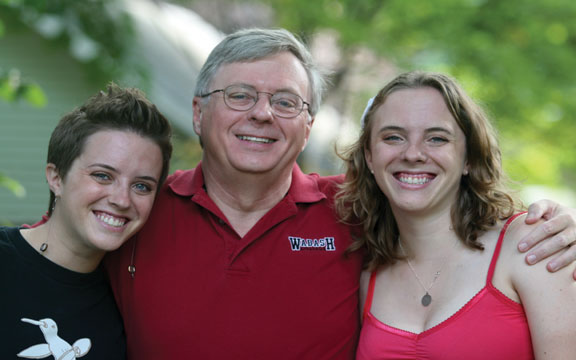From Center Hall: Daughters and the Necessary Dad |
| Printer-friendly version | Email this article |
|
With Molly and Katie this amazement is even more pronounced because Molly and Katie are daughters, and they are twins. As daughters they are other, different. Much divides fathers from sons. Though I have been profoundly lucky in my friendship with my son Paddy, literature and life tell me of the crushing, clanking dissonance that can come between fathers and sons. But sons and fathers at least begin with a presumption of similarity. Every Dad has been a son.
Daughters and fathers come together with the assumption of difference. Every conversation has the potential to end in, "How can you understand what I am going through?" As twins, though fraternal and not identical, Molly and Katie begin at a deeper remove. They are their own country; and their big brother, their many friends, and even their Mom and Dad get invited to the border to watch and wonder.
The closest relationship in their life is with one another. They are always protected, or at least always connected. When Katie would cry when they were toddlers, Molly would immediately cry as well, always the little mirror of empathy. Katie would direct and guide Molly, bossing her around. Katie was taller, blonde, strong-willed; Molly was shorter, sensitive, brunette, the peacemaker, the resonant bell to the mood and feelings of the household. They were also one another’s teachers, and as they grew Molly would teach Katie patience and sensitivity, and Katie would help Molly grow strong and fierce.
WHAT DID A DADDY HAVE TO DO with such self-reliant daughters? Was a Dad even necessary? When Molly and Katie were born, I was helping Chris at the delivery, but they were premature and underweight and they were whisked away to the neonatal intensive care unit. For a few days we watched them through tubes, incubators, and plexiglass. In time we would be able to hold them on a regular schedule until they came home, strong and well, weeks later. But as we prepared to leave them that first day at the hospital, which was 35 miles from where we lived in a small Iowa town, Chris cried, "What are we going to do?" Paddy, not yet four, in the back seat said, "We can hold them in our hearts."
That is what I have tried to do—hold Molly and Katie in my heart, to love them even when they did not want a Daddy’s love, to respect their silence after a soccer defeat or a disappointing race, to be both a part of them when wanted, and apart from them when necessary. I am no expert at fatherhood, but in asking myself what I have done, I come up with a simple, repeated act: I have watched. This is at times an act of protection, as in watching over them, but most often it is an act of witnessing, of looking on, of being there to be a spectator in their lives, a cheerleader for their highest ambitions.
THIS SOUNDS SO REMOVED AND PASSIVE. It is not. For all along I have known they are watching me watch them. They wanted to know: Will Daddy be at the dance recital? Will he come to the orchestra performance? Will he be there for the Quiz Bowl championship? As a watcher, I have, it seems, an easy job—to be a witness, to gaze, to remember. But it is not easy to always know the right way to see. I cannot say, "Good race," when the race was not good, but I can say, "Katie, look at the dew on the grass, notice the mud on your teammates’ legs, look at how these other women are waiting for you to join them, their captain, their leader...you will remember this when the shin splints and your disappointment are forgotten." And drying her eyes, she runs off to join her teammates, who are watching her, needing her to be their captain.
Or when I see Molly’s senior show, and I see her artwork, I admire and praise, and point out the light in the eyes of a little boy who happens to be walking through the gallery as he sees on Molly’s large pottery in the Greek fashion, not only the black-on-white Zeus, but the full-color Superman counterpoised. "In that child’s eyes, Molly, you see the confirmation of your identity as an artist." Molly could have reacted with a wisecrack, but she just nodded and said, "Yes."
They watch me watching their world. Here is where I am necessary. I stopped being able to help Molly and Katie with their math homework somewhere around the sixth grade. Katie was doing research in chemistry that I could hardly understand by the time she was a sophomore in college. Molly’s art is mentored not by her sometime-art-critic father, but by her teachers and the artists she admires. I am not needed there.
My daughters are smarter, and wiser, and often better humans than I am. They may ask my advice on writing once in a while. But even the daddy tasks of putting things together they pretty much handle themselves. Molly is handier with every tool, and Katie is a much more systematic thinker. So where is Dad necessary? What can I do? I can witness. No one, not even Chris, their mother, can be the same witness to their wonder as Dad can be. Daddy can watch them shine.
When she was smaller Katie used to run with me, and I would worry about her getting tired. At Disney World this past June, we went out running together one morning. I knew she was worried about my breathing. She was too good a watcher to tell me of her concern, but I know that day we ran a shorter distance and slower than she would have run alone. And as I worry about Molly pulling all-nighters to fire her pottery or finish her paintings, she worries about me, staying up too late or rising too early, working too hard.
In 2003 we had one of our great family vacations. Years before that when we first visited the Grand Canyon we said it would be neat if we could hike rim-to-rim. When Paddy graduated from the University of Chicago and Molly and Katie graduated from high school, we fulfilled that family dream. We hiked nine miles down from the South Rim the first day on a blazing hot Fourth of July. When Chris began to get sick in the heat, it was Molly and Katie who took over her backpack and guided her to the stream to cool down.
The next day we hiked halfway up the North Rim, Molly and Katie strong ahead with their brother, Mom and Dad following. And on the last day, we hiked seven miles, the steepest part of the climb, rising over 4,000 feet. I hiked like a tipsy roller skater, sometimes crossing one foot over another, and Molly and Katie would call out softly to me, almost in a whisper, "Watch the edge, Dad," or simply, "Inside trail, Daddy." Walking me home as I walked them home so many times, trying to give me enough freedom, careful of my feelings, gentle and sweet, as I tried to be with them. They watched me as I had watched over them, and as evening came we reached the top of the canyon and looked out over how far we had climbed, and my heart filled with pride at how strong and brave the women I have watched grow up, my daughters, had become. I am proud that they have become watchers, too.
NOW THEY WATCH THEIR POOR DAD, but their care and awareness do not stop there. They watch and care for their friends. They watch and learn about Wabash and develop a network of friends among Wabash men. They draw connections in the circle of their seeing. They watch.
Paul Simon’s newest album has a wonderful song, "Father and Daughter." Even a few lines of the song can bring tears, and I was forbidden to even hum it during Molly and Katie’s graduation weekend at Saint Mary’s College this May.
I believe the light that shines on you
I’m gonna watch you shine
I say these words now to them as prayer, as promise, as blessing on these two wonderful women whom I will watch over the rest of my life and who now return the favor by watching over me, our family, their friends, their world.
Contact President White at: whitep@wabash.edu
|

 ALL THREE OF OUR NOW-GROWN CHILDREN are wonderful. This is not mere Daddy brag, but an attempt at a precision of language. Our children, whom I have known and loved so long, continue to fill me with wonder, literally and deeply. They are magical beings not because of what they have accomplished and who they have become, but mostly because they continue to dazzle me and surprise me, to be as wonderful as newborns.
ALL THREE OF OUR NOW-GROWN CHILDREN are wonderful. This is not mere Daddy brag, but an attempt at a precision of language. Our children, whom I have known and loved so long, continue to fill me with wonder, literally and deeply. They are magical beings not because of what they have accomplished and who they have become, but mostly because they continue to dazzle me and surprise me, to be as wonderful as newborns. IN THE END I HAVE WATCHED them grow. I have watched them need my protection not much, my advice rarely, and my financial support much less as time goes on; but they still need my watching. They have, in turn, watched over me.
IN THE END I HAVE WATCHED them grow. I have watched them need my protection not much, my advice rarely, and my financial support much less as time goes on; but they still need my watching. They have, in turn, watched over me.